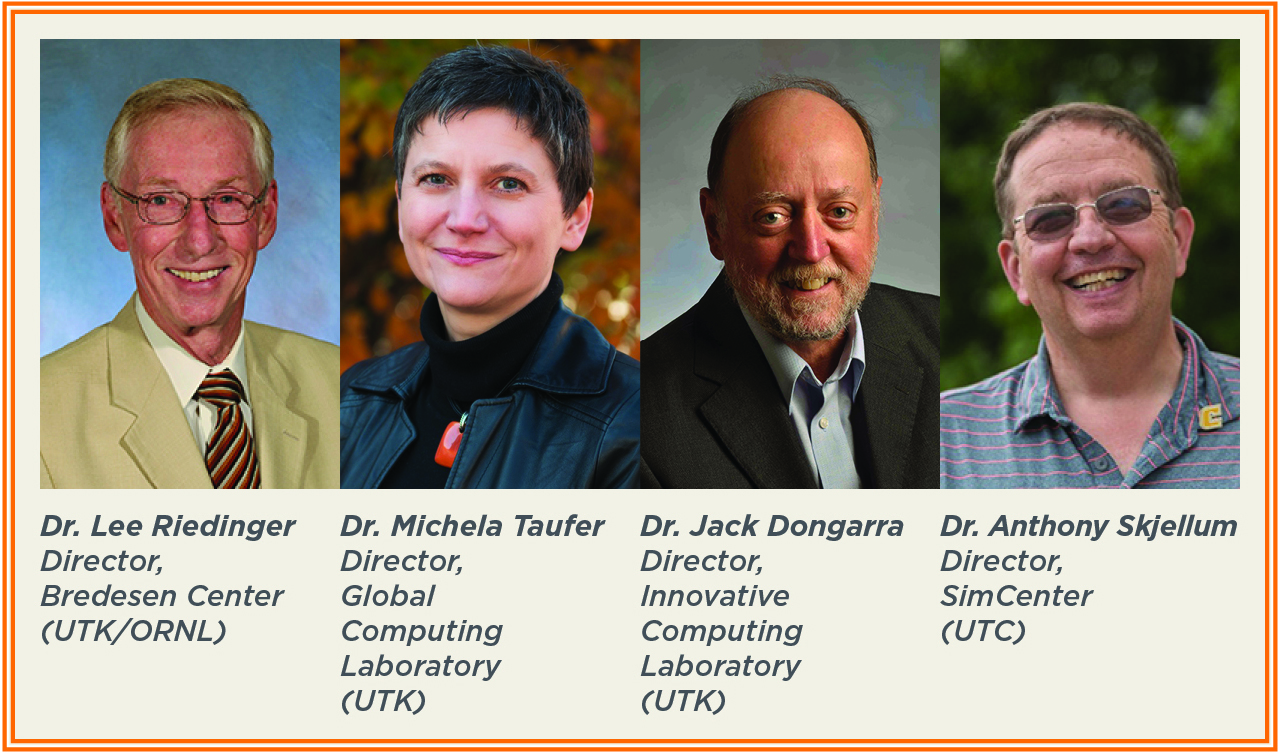
Four computational science research centers from the University of Tennessee—the Bredesen Center, the Global Computing Laboratory, the Innovative Computing Laboratory, and the SimCenter—will represent the university at this year’s International Conference for High Performance Computing, Networking, Storage, and Analysis (SC18) on November 11–16 in Dallas, Texas.
In modern science, computational modeling and simulation using high-performance computing (HPC) represents a new branch of scientific methodology, known broadly as “computational science,” that now sits alongside traditional theory and experiment. Computational science is accelerating things like drug development and energy research and enabling scientists to tackle problems that were simply intractable without HPC.
SC18, sponsored by the Association for Computing Machinery (ACM) and the Institute of Electrical and Electronics Engineers (IEEE), brings together over 10,000 scientists, engineers, and industry leaders in HPC for invited talks, panels, research papers, tutorials, workshops, posters, and Birds of a Feather sessions. This capstone conference enables the principal architects of HPC and computational science to share new insights and ideas with their peers and nurture essential collaborations in the field. For its part, the University of Tennessee has a decades-long history in HPC and computational science—boasting four major research centers described below—and SC18 is the ideal venue to present its cutting-edge research.
Bredesen Center
The Bredesen Center offers one of the world’s leading interdisciplinary PhD programs in Data Science and Engineering (DSE) by bringing together students and researchers from the University of Tennessee, Oak Ridge National Laboratory (ORNL), the University of Tennessee Health Sciences Center, and the University of Tennessee at Chattanooga. The Bredesen Center distinguishes itself from traditional PhD programs by allowing students to create customized PhD experiences working on interdisciplinary projects sponsored by the U.S. Department of Energy as well as other government agencies. DSE students have access to world-class computing expertise and resources at the university and at ORNL—including ORNL’s new Summit supercomputer. A large array of other ORNL facilities generate unique scientific data sets and enable cutting-edge research in computational and data sciences. DSE focus areas include life and health sciences, materials science, advanced manufacturing, national security, transportation, urban systems, and environmental sciences. The Bredesen Center also offers an interdisciplinary doctorate in Energy Science and Engineering.
Global Computing Laboratory
The Global Computing Laboratory, headed by Prof. Michela Taufer, focuses on various aspects of HPC and its use in application science. The lab is engaged in the design and testing of efficient computational algorithms and adaptive scheduling policies for scientific computing on GPUs, cloud computing, and volunteer computing. Interdisciplinary research with scientists and engineers in fields such as chemistry and chemical engineering, pharmaceutical sciences, seismology, and mathematics is at the core of the lab’s activities and philosophy.
Innovative Computing Laboratory
The Innovative Computing Laboratory, founded by Prof. Jack Dongarra in 1989, is a large computer science research and development group situated in the heart of the University of Tennessee’s Knoxville campus. The lab’s mission is to ensure that the University of Tennessee is a world leader in advanced high-performance and scientific computing through research, education, and collaboration. Specializing in numerical linear algebra, distributed computing, and performance analysis and benchmarking, the lab employs over forty researchers, students, and staff, and has earned many accolades, including four R&D100 awards.
SimCenter
SimCenter, headed by Prof. Tony Skjellum, is a research incubator at the University of Tennessee at Chattanooga (UTC) for interdisciplinary work with a foundation in HPC, modeling and simulation, data analytics, and machine learning. The SimCenter helps faculty and students at all levels advance their research and learning in a variety of fields including biology, computer science, mathematics, energy, the environment, smart cities, aerospace, and advanced materials. SimCenter is also UTC’s core facility for advanced computing and network infrastructure and offers HPC and Virtual Private Cloud Resources for faculty and outside collaborators undertaking computing and big data problems across a spectrum of disciplines. One of the center’s goals is to facilitate interdisciplinary collaboration in computational sciences and engineering by providing meeting space, making connections among faculty, and offering proposal development and other research support.